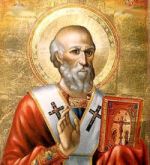Catechism of the Catholic Church
Share this paragraph of the Catechism:
Paragraph:
2109 The right to religious liberty can of itself be neither unlimited nor limited only by a "public order" conceived in a positivist or naturalist manner. 39 The "due limits" which are inherent in it must be determined for each social situation by political prudence, according to the requirements of the common good, and ratified by the civil authority in accordance with "legal principles which are in conformity with the objective moral order." 40
Move forward or back a paragraph: Previous | Next
Where this paragraph appears in the Catechism:
TABLE OF CONTENTS
» |
PART THREE: LIFE IN CHRIST |
» |
SECTION TWO: THE TEN COMMANDMENTS |
» |
CHAPTER ONE: YOU SHALL LOVE THE LORD YOUR GOD WITH ALL YOUR HEART, AND WITH ALL YOUR SOUL, AND WITH ALL YOUR MIND |
» |
II. "HIM ONLY SHALL YOU SERVE" |
Notes for the above paragraph:
39 Cf. Pius VI, Quod aliquantum (1791) 10; Pius IX, Quanta cura 3.40 DH 7 § 3.
English Translation of the Cathechism of the Catholic Church for the United States of America © 1997, United States Catholic Conference, Inc.






